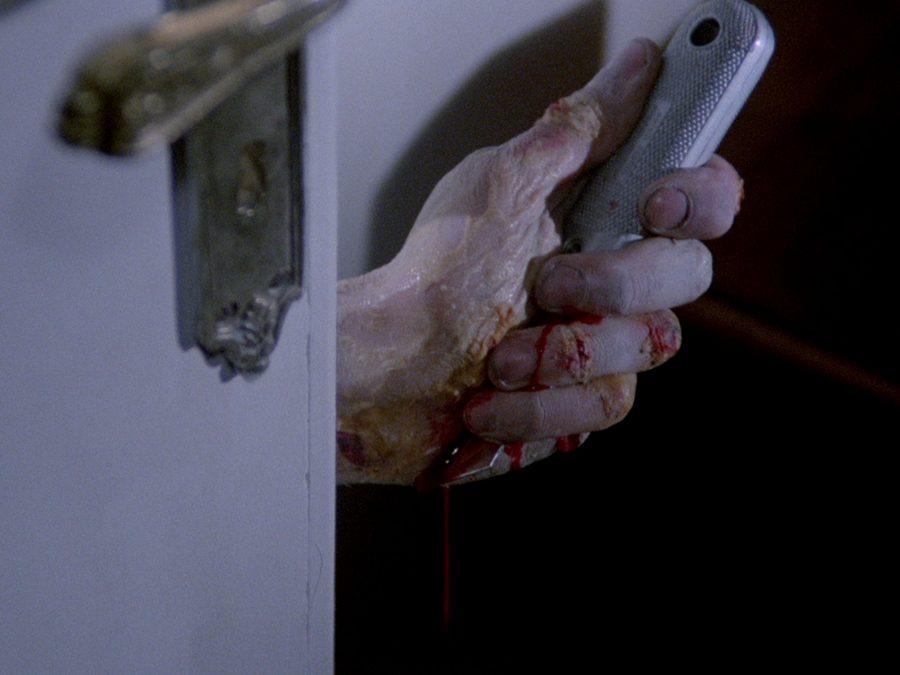Shock opens with handheld footage of a house that has clearly been long uninhabited, even as removals men arrive with a family’s crates of belongings. This previously empty house is about to become a home again, at least temporarily, for Dora (Daria Nicolodi, never better), who had been living there seven years earlier until one day her junkie husband Carlo (an uncredited Nicola Salerno) vanished in a presumed suicide, leaving behind an abandoned boat, his pregnant wife and their unborn child.
Now for the first time Dora has come back to the place with seven-year-old son Marco (David Colin Jr), and with her second husband the commercial pilot Bruno Baldini (John Steiner). Dora appears to have recovered fully from the mental breakdown, amnesia and institutionalisation that followed Carlo’s disappearance. Yet there are signs that her adjustment to the expected rôle of housewife and mother remains incomplete.
For Dora burns their first dinner back in the new house, and accidentally knocks over the pot in which she is making Bruno’s morning brew – and as Bruno half-jokingly comments, “There’s nothing worse for a marriage than sending a husband off without his coffee”. Dora had suffered unspeakable trauma in this house, and her return is also a regression, immediately triggering nightmares and anxieties about a past that is not quite buried.
“Marco? Marco?”, Dora calls out, as she looks for her young son shortly after the family has arrived at the house. In his first appearance (and words) in Shock, the little boy playing in the yard will respond, “Marco – that’s my name.” It is a straightforward assertion of identity that the rest of the film will gradually complicate, as Marco proves very much his missing father’s son, with an emerging antipathy to his stepfather and a deeply troubling attraction to his mother.
When Bruno makes love to Dora on the couch downstairs, Marco is revealed declaring jealously from his bed upstairs, “Pigs! Pigs! Pigs!”. Later, when the next sequence shows Marco and Dora playing together in the garden and Dora falling supine to the ground, Marco hurls himself on top of her in a taboo imitation of Bruno’s previous sexual position (even if mother and son are fully clothed). Predictably, when Bruno is away for work, Marco also wants to take his stepfather’s place in the bed with Mama.
Explaining death to Marco, Dora says, “One goes away forever, but we’ll keep Daddy alive within us.” While Dora increasingly comes to believe that Marco has been possessed by the revenant Carlo, the film maintains the possibility that Marco’s Oedipal behaviour is of a more straightforwardly Freudian variety, in a household fraught with unspoken guilt and psychological tension.
In fact Dora, whose own visions of Carlo come eroticised with an alarming necrophiliac edge, has an actual psychiatrist on hand to rationalise her experiences. In the face of Dora’s paranoid ravings about the house being haunted and the ever more unruly Marco being possessed, Dr Aldo Spidini (Ivan Rassimov) presents an alternative reading of events, more grounded in reality: “Dora, ghosts are mere figments of our imagination – we ourselves create them, to justify our actions and behaviour.”

Shock gets to have it both ways, letting psychological and supernatural frames vie to explain all the domestic dysfunction. Are the unnatural events merely manifestations of Dora’s PTSD-induced hallucinations, as she becomes haunted by her own conscience? Is sensitive, lonely, mischievous Marco conjuring an imaginary playmate in the house, or just picking up the bad vibes from the adults around him – or might he even have inherited the delusions of his mother and “half-mad” father? Or is Carlo really wreaking revenge through Marco from beyond the grave?
Certainly American distributors capitalised on that last interpretation by renaming the film Beyond The Door II as though it were a sequel to Ovidio G Assonitis and Robert Barrett’s 1974 possession horror (which was the only other acting credit for young David Colin Jr, but is otherwise an entirely unrelated film). In fact, though, Shock gives us cause to entertain any or all of these possibilities. In its uncanny ambiguities, this is more modern gothic than ripoff of The Exorcist.
Shock is perhaps best known for being the last theatrical feature from Italian jack-of-all-genres and master stylist Mario Bava before his death in 1980. Bava had originally worked pre-production on the script by Dardana Sacchetti and Francesco Barbieri (who had both also helped with the story of Bava’s 1971 proto-slasher A Bay of Blood) as early as 1973, with neurosis queen Mimsy Farmer lined up for the rôle of Dora.
That project was eventually shelved, but after a series of failed productions, Bava was encouraged to return to the screenplay by his son Lamberto, who helped him direct. It also featured the last soundtrack to be composed and played by the band Libra, before they broke up – a pulsing, progressive electro-acoustic score carefully calibrating all the menace and madness. The film’s status as swan song brings with it a certain weight of expectation that might leave followers of Bava’s long career feeling disappointed.
Shock hardly seems a summation of the maestro’s extensive oeuvre, let alone some kind of final statement. Yet viewed on its own terms, this is a creepily transgressive update of the haunted house movie, full of psychosexual thrills, trippy dream sequences and sustained dread, all plunging a curious young child into a game of very adult preoccupations and perversions.
Shock is released on Blu-ray, in a brand new 2K restoration from the original 35mm camera negative, on 17 January via Arrow Home Video.
The post Discover the trippy, transgressive pleasures of Mario Bava’s swansong appeared first on Little White Lies.


0 Comments